

Each morning St. Andrews Reformed Episcopal Church conducts morning prayer and this blog post is a summary and reflection of the passages read. This summary will tie into the work of Bishop Ray Sutton in his work Captains and Courts.
Scripture Readings from Morning Prayer:
Friday, 1st Sunday After Easter Morning Prayer, April 14th, 2023
The intricate tapestry of biblical narratives often weaves together themes and symbols that provide deeper insights into spiritual truths. In today’s reading the episcopal government, is revealed through types and shadows found in the Scriptures and confirmed by Christ in the New Testament. In the book “Captains and Courts” by Bishop Sutton, a compelling argument is presented, shedding light on the significance of this interpretation. By examining the roles of Jethro and the captains of tens, fifties, and hundreds, we can discern parallels with the Melchizedek priesthood and the miraculous feeding of the five thousand.
Captains and Courts: A Defense of the Episcopal Government
To begin with, Jethro, a Midianite priest and father-in-law to Moses is a Spiritual advisor in the Exodus narrative. In Exodus 18:19, Jethro advises Moses, saying, “Listen now to my voice; I will give you counsel, and God will be with you.” This interaction carries gravitas, alluding to the presence of a spiritual authority resembling the Melchizedek priesthood. Because of the context of the story, Jethro isn’t acting for a priesthood we haven’t heard about. Jethro’s wisdom to Moses serves as a catalyst to the establishment of a hierarchical structure within the Israelite community.
Bishop Sutton’s book draws attention to the language used in Mark 6:39, where Jesus commands His disciples to have the people sit down in groups on the green grass “in hundreds and fifties.” This choice of words is significant, as it echoes Jethro’s organizational structure. The captains of tens, fifties, and hundreds were appointed to assist Moses. By mirroring this pattern during the feeding of the five thousand, Jesus establishes a connection between the ancient echoes of Jethro’s borders and His own authority.
By examining various passages considering one another, we gain a broader perspective on God’s plan and purpose. Just as the Old Testament foreshadowed the coming of Christ, the New Testament often provides clarity and fulfillment to ancient prophecies and types. The concept of episcopal government presented through the figures of Jethro and the captains offers profound insights into the structure and organization of spiritual authority. As the Melchizedek priesthood foreshadows Christ’s eternal priesthood, these types and shadows illuminate the divine pattern and order established by God throughout history.
Christ and His Captains and Courts
The hierarchical system within the Israelite community, established under Moses’ guidance, points towards greater fulfillment in Christ’s authority over His Church. As captains oversee groups of individuals, feeding them spiritually, so does Christ. Christ the ultimate Captain, provide sustenance to His followers, exemplified in the miraculous multiplication of loaves and fishes. The book “Captains and Courts” invites readers to explore these connections and reflect on the wisdom revealed through types and shadows. It encourages a deeper appreciation for the intricate design of Scripture and timeless truths.
Lastly, the concept of episcopal government revealed through types and shadows, offers insights into the spiritual significance of Jethro and the captains of tens, fifties, and hundreds. Bishop Sutton’s book “Captains and Courts” delves into parallels between these figures and the Melchizedek priesthood, as well as the miraculous feeding of the five thousand. By developing a full view of Scripture as a story of beauty rather than a textbook of mere facts, we can uncover meaning and appreciate the divine order established by God throughout history.
Coram Deo
Scripture calls us to honor and support leaders appointed by God. In Exodus 18:21, we are urged to seek capable individuals who fear God and appoint them as chiefs over the people. Romans 13:1 reminds us that all authority comes from God. Hebrews 13:17 emphasizes the need to obey and submit to leaders who watch over our souls. Commit to praying for our leaders, respecting them, submitting to their guidance, encouraging them, and following godly examples. In doing so, we honor the Lord, and contribute to the flourishing of the Christendom.
Related Sources:
Our Mission
To multiply faithful servants of Christ; who will commit themselves to the worship and doctrines of the Anglican way, and who will work by God's grace and for His glory to disciple the nations through the ministry of the Church.









